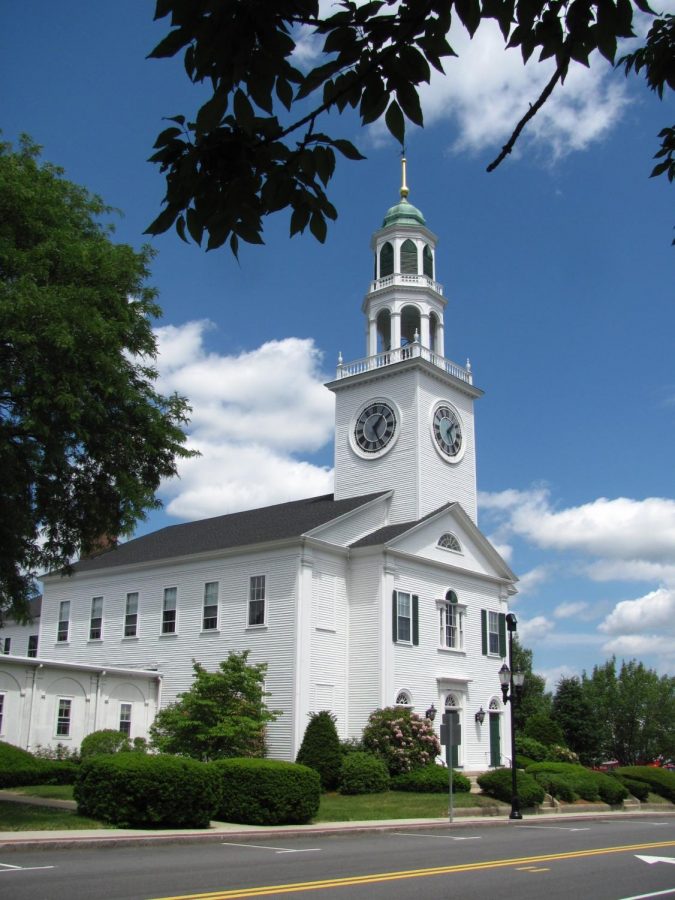As Food Insecurity Rises, Reading Food Pantry Responds
Old South United Methodist Church houses the Reading Food Pantry. Photo used without modification from https://commons.wikimedia.org/wiki/File:Old_South_United_Methodist_Church,_Reading_MA.jpg
December 22, 2020
According to the Washington Post’s recent August article, 1 in 7 or 46 million Americans rely on food pantry services to feed themselves and their families. Due to the pandemic 17 million more people are struggling with food insecurity. Locally in Massachusetts approximately 15% of residents will deal with food insecurity by the end of 2020. There are thousands of food banks and pantries nationwide doing their best to help, but there is one right at home working harder than ever.
Inside the Old South United Methodist Church off of Main Street, the Reading Food Pantry’s shelves are stocked with all sorts of canned food. The food pantry’s director Phyllis Maxwell and other volunteers are working hard to make sure everyone who needs it can get a meal for Christmas. Due to COVID, Maxwell says that they are limited in the number of volunteers and staff that can work at a time. “Today there were 11 volunteers/2 working outside of the building. Monday night may have 10-12 volunteers or a few more. We also have a group receiving donations on Wednesday. Probably 5 or 6. There is also a small delivery group 7-8. We are at our limit of volunteers as of now.”
Like Thanksgiving the food pantry expects a large crowd for Christmas. 50% of the food pantry’s clients are 65 or older. All clients must be approved by Kerry Valle, the town case worker and must be a Reading resident. “Right now we are serving 120 households.”, Maxwell explains “We saw an increase in clients when COVID hit and unemployment hit”. Much like everything this year COVID has left an impact on food insecurity as well. The organization Feeding America estimates that nationwide 50 million people may experience hunger due to COVID and 80% of food pantries and banks are serving more people than they had last year.
So how does the Reading Food Pantry meet this growing need?
Donations. A large portion of the food in the food pantry comes from a donation of some sort. There is the typical donation of non perishable foods or other goods. Non perishable foods are essential foods that don’t go bad or have really long expiration dates. Most of these foods are canned. Maxwell says that the food pantry is always in need of canned meats, salmon, tuna, turkey, sardines, chopped clams, beef stew, chili, and hash. In addition to the food items, the pantry also needs plastic sandwich, storage, and trash bags.
Not all donations are food related, though. There are also monetary donations. “Money comes from donations from individuals, organizations, local clubs, sports organizations, businesses, religious groups/churches, etc.” Maxwell says, “The whole community supports us.” The food pantry uses the money to buy food that they need from Market Basket or Stop and Shop. With monetary donations food pantries are able to purchase fresh produce and other foods that otherwise are in demand but can’t be donated.
Additionally with the monetary donations the Reading Food Pantry will give out $25 gift cards to all their clients like they did for Thanksgiving. “The community has been very generous in food and monetary donations,” Maxwell says.
The holiday season and this year collectively has led to people extending their generosity further. In Atlanta, celebrity Tyler Perry hosted a Thanksgiving food giveaway. His food giveaway resulted in a 5 mile line through the city. Similar to his efforts, Reading’s NHS community hosted a food drive for the Reading food pantry. In place of their Halloween “trick or treat’’ food drive, NHS collected donations outside all of the public schools in Reading. “We were collecting donations essentially from all families and staff of Reading Public Schools who were willing to donate,” comments NHS officer Ally Tesoro’21.
It is typical to donate non perishable items to food pantries such as canned food but the food pantry needs more. Due to COVID the sale of disinfectants has grown 385%, multipurpose cleaners 148%, toilet paper 60%, and paper towels 40%. When the pandemic first broke out to now there is still a shortage of cleaning supplies. Just like Americans across the country, food pantries are in need of cleaning supplies as well. Tesoro commented that in addition to collecting non perishable foods, NHS collected laundry detergent and soaps. Maxwell says due to the pandemic they are in need of cleaning supplies such as Lysol, sanitizer and more, and adds that toilet paper and facial tissue are also in demand.
Donations are not the only way the food pantry gets their food, however. Some of the food comes from food banks. Oftentimes the food pantry and food bank are used interchangeably, however they are not the same thing. Food banks are large, oftentimes warehouses where food is collected. The food banks then distribute this food to food pantries in their reach. Food pantries receive the donations, and unlike food banks, supply directly to the community. One of the food pantries in the reach of the Greater Boston Food Bank is the Reading Food Pantry.
COVID has affected nearly everyone and made life harder. However the Reading Food Pantry and other food pantries and banks around the country are working hard to take one burden away. The holiday season is a common time to give; however, families are still in need after. Food pantries need the community’s help all year round. The Reading Food Pantry and others make a huge difference in people’s lives, but they can’t do what they do without the community. So while the holiday season is almost over, it’s still important to keep giving and supporting the community.

Sharon Burke • Dec 23, 2020 at 10:27 am
Great article. Made me think about what happens after the holidays when donations drop; the importance of sustained giving cannot be over-emphasized during this difficult time.